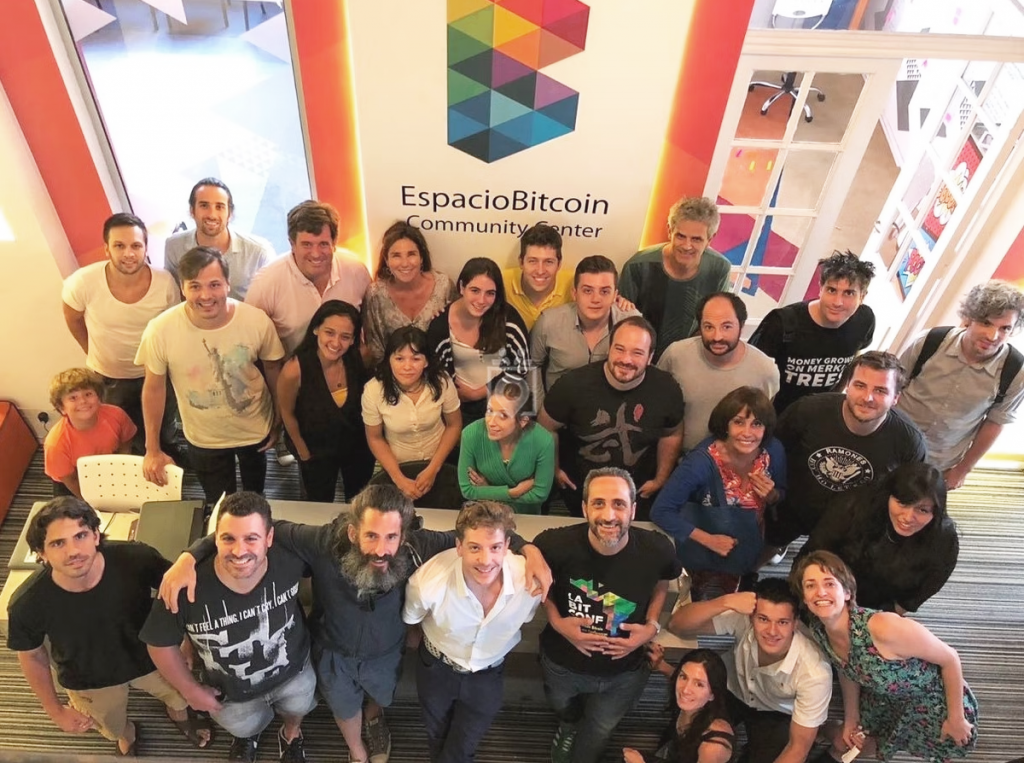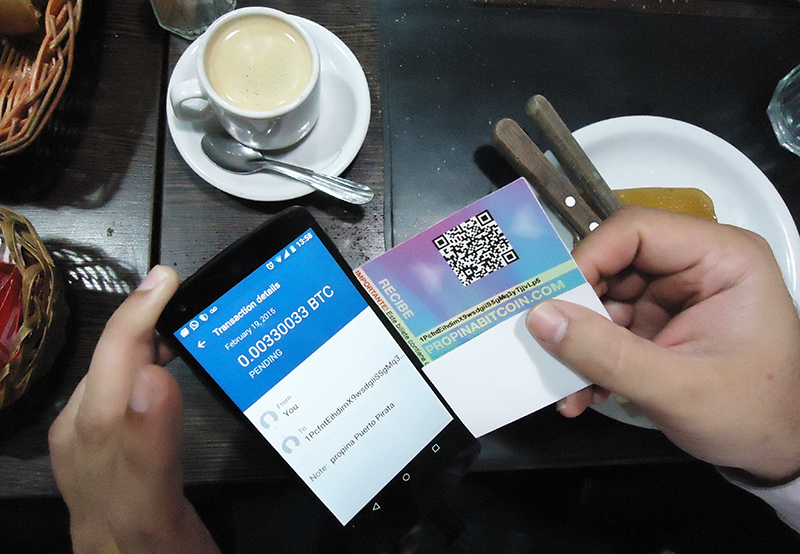Buenos Aires will host this year’s Latin American Bitcoin Conference, starting on November 11. Let’s have a look at the Bitcoin scene in this exciting city.
“Cambio, cambio, cambio” – you hear it all over the pedestrian area of central Buenos Aires, where moneychangers stand at every corner. Buying dollars, euros and other foreign currencies is strictly regulated in Argentina. If Argentinians want to officially change pesos into dollars through their bank, they need to prove that they intend to travel abroad and submit their tax return before completing the exchange. Even after submitting proof, they are only entitled to limited amounts of foreign currencies. As a result, the black market for dollars and euros is flourishing.
Argentinians don’t call this free market black, but blue, which is Argentina’s national color. Although exchanging dollars on the free market is officially illegal, Argentinians do it anyway. The Blue Dollar’s exchange rate is posted across websites and discussed in the finance pages of major newspapers.
Inflation and Frozen Accounts
Argentinians have a variety of reasons for their distrustfulness of the ever-devaluing peso, in their government, and in banks. To save money, Argentinians prefer to buy dollars on the “blue market” and hide them in their house – it would be unthinkable to leave large amounts of money in a bank account.
The memory of the 2001 Corralito (“the little corral”) is still fresh. During the Corralito, bank accounts were frozen for nearly a year and only small amounts of money could be withdrawn. Then, the peso was massively devalued, and as a result people lost significant portions of their personal savings. Similar measurements of capital control were applied in Cyprus 2013 and in Greece in 2015. But while Europeans may still consider this to be out-of-the-ordinary, Argentinians have come to expect such behavior from their banks and governments.
They have suffered repeatedly through hyperinflation, government defaults and currency devaluations. In the late 19th and early 20th century, Argentina was one of the richest countries in the world, blessed with natural resources, fertile soils and a rapidly growing immigrant workforce. “Rico como un Argentino” (“rich as an Argentinian”) was a common Spanish expression.
But for decades the country was ruled by socialist politicians who ruthlessly tampered with the economy, and as history is teaching us again and again, even a naturally rich economy can be run down by socialist experiments.
It is no coincidence that the Bitcoin scene in Argentina is one of the most vibrant in the world. Money that cannot be manipulated by politicians and which works without banks – you don’t need to explain to an Argentinian why that is a good thing!

The Espacio Bitcoin
Not far from the “blue money changers,” in a major location of central Buenos Aires lies a four story building with 500 square meters of rentable space: the Espacio Bitcoin. Many Bitcoin startups have their offices here, and many meetups and public lectures on digital currencies take place in its meeting hall. On the ground floor there is a pirate-themed restaurant where waiters wear red bandanas and black vests, and where you can pay for your meal in Bitcoin.
“In the US, the restaurant owner would probably change his Bitcoins into dollars right away,” says Rodolfo Andragnes, one of the founders of Espacio Bitcoin. “But here, he prefers to keep them. The Bitcoin price may go up and down, but with the peso you can be sure it will only lose value.”

Rodolfo scans a QR code on the screen of the restaurant’s POS. One more click and the Bitcoins for a steak with french fries are on their way. “I pay with Bitcoin wherever I can,” says Rodolfo, who had registered the domain name bitcoins.com in 1998, ten years before the invention of Bitcoin. In 2012 he sold the domain to Mt. Gox, which at the time was the leading Bitcoin exchange – the deal was made in Bitcoins, of course.
Rodolfo is adamant that he has nothing to do with the invention of the digital currency, and that he has never met its creator Satoshi Nakamoto. But today he is one of the most active evangelists of the digital currency in South America. He is the co-founder of Bitcoin Argentina, a nonprofit organization that promotes Bitcoin. Rodolfo is also the main organizer of the Latin American Bitcoin conference, which takes place every year in a different Latin American country.
“I want my kids to grow up in a world without the fear of inflation or frozen bank accounts,” he explains. Rodolfo and his co-founders in Espacio Bitcoin and Bitcoin Argentina, Diego Gutiérrez Zaldivar and Franco Daniel Amati, met in early 2013 at one of the first Bitcoin meetups in Buenos Aires. Only a few months later they organized a top-notch conference with a number of international speakers.
“At Espacio Bitcoin many Bitcoin startups work next to each other, so one can exchange ideas and experiences and cooperate on projects,” explains Diego, who founded his first Internet company at the age of 16. “We also organize public talks and get-togethers in our event room – and we have great parties and barbecues on our spacious roof terrace.”
Hot Spot Buenos Aires
Buenos Aires is undeniably one of the hot spots for the global Bitcoin economy. Argentina has many well educated software developers who work for international companies, as well as many creative startup entrepreneurs. But the main reason: while the advantages of Bitcoin are not widely understood in the US or Europe yet, Argentinians know the flaws of the current monetary system from first-hand experience.
“In the times of the Corralito, many people lost a lot of money, including my family,” says Diego Gutiérrez, co-founder of IOV Labs, a company that develops software that makes smart contracts possible on the Bitcoin network. “You could feel a great sadness everywhere, and the aftermath is still present. That’s why people here are more open to alternatives to banks and government money than in countries where people cannot remember the last national bankruptcy.”
Bitcoin growth rates in Argentina are significantly higher than in the US or Europe, yet in absolute figures the number of users is still quite low. As always, innovation takes a while to prevail. For most Argentinians, dollar bills under the mattress are still the most popular way to save money.
But the more desperately the government tries to prevent illegal dollar trade – even using specially trained dogs to detect cash at border controls and airports – money that can easily be moved across borders becomes more and more attractive to defend yourself against financial tyranny.
This an excerpt of the book The Beginners’s Guide to Bitcoin and Austrian Economics by Aaron Koenig.